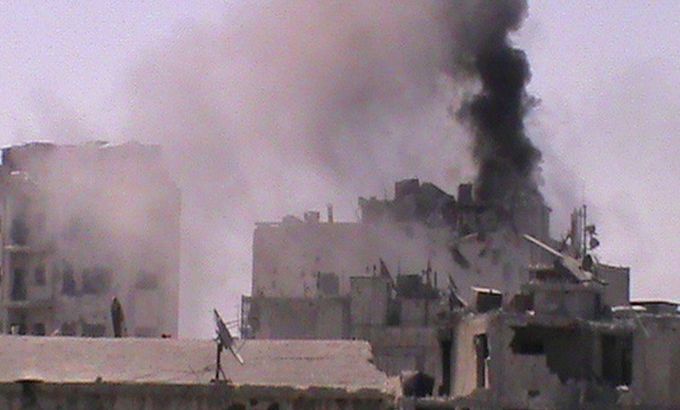Syrian military and fighters clash in Aleppo
Violence reported in several towns as rebels battle to take control of border crossings into neighbouring countries.

Violence is raging in several locations across Syria, with activists reporting some of the heaviest clashes to date in the country’s commercial capital of Aleppo.
Government forces and rebels were reportedly clashing for a second day in the city’s Salaheddine district on Saturday.
Aleppo-based activist Mohammad Saeed said dozens of rebels from the Free Syrian Army were in the city.
“The uprising has finally reached Aleppo,” Saeed said.
Until recently, Aleppo was largely shielded from the violence that has plagued other Syrian cities over the course of the uprising against President Bashar Assad.
The clashes appeared to be spreading by early Saturday afternoon, according to the Syrian Observatory for Human Rights.
“Violent clashes are taking place between Syrian regime forces and rebel fighters in the Sakhour neighbourhood and the Haydariya area,” the UK-based group said.
The Local Co-ordination Committees activist network and the Observatory said Friday’s fighting forced many residents to flee to safer areas.
The Observatory also reported heavy clashes at the entrance of al-Rastan, a rebel stronghold in Homs province, saying troops were trying to enter the town.
Meanwhile, UN chief Ban Ki-moon said on Saturday that an envoy will be dispatched to Syria to assess the situation as violence increases in the embattled country, and says Assad’s government must stop “the killing and the use of heavy weapons” against population centres.
Tense calm in Damascus
Meanwhile, a tense calm prevailed in the capital, Damascus, after six days of intense fighting.
The army deployed tanks on Friday to push rebels out of al-Midan neighbourhood, where fighting left cars gutted and fighters’ bodies in the streets.
Al Jazeer’a Rula Amin, reporting from Beirut, Lebanon, said that the fighters seemed to have been “pushed out” of the capital.
“For example, in al-Midan, they are no longer in control, and the neighbourhood is no longer off limits to the government forces,” said Amin.
“What we are seeing is the government pushing in each neighbourhood it thinks the rebels are [present].”
Battles involving troops bringing in tanks, helicopters and mortars have turned parts of Damascus into combat zones, and sent thousands of Syrian families packed in cars streaming across the border into neighbouring Lebanon.
More than 200 people were killed across the country in a single day on Friday, activists said.
Despite being forced out of al-Midan, the armed opposition appear to have gained momentum across the country in recent days.
Four senior officials were killed after bomb went off during a high-level security meeting in Damascus on Wednesday, according to government media.
Rebels have also managed to seize border checkpoints in recent days.
Fighters have held the Abu Kamal crossing between Syria and Iraq since Thursday, and despite government forces having heavily shelled it on Friday night, it remained in rebel hands on Saturday.
Sources also tell Al Jazeera that the the crossing at Rabia was under the control of the opposition as of Saturday evening, with celebratory gunshots being heard from rooftops in the area.
Separate control points
In addition, the Free Syrian Army (FSA) has taken control of the Bab al-Hawa crossing on the border with Turkey.
Al Jazeera’s Andrew Simmons, reporting from Cilvegozu on the Turkish side of the frontier, said the FSA had established a proper checkpoint, controlling any traffic coming through.
“The Free Syrian Army is in control of the first part of the main road into Syria but the regular Syrian army has some sort of base a few kilometres down the road,” he said. “We spoke to Syrian who’ve been fleeing. They say they passed through two separate control points, one manned by the regular army and one by the FSA.”
Simmons said traffic was being restricted on the Turkish side, with truckers being warned that they were crossing the border at their own risk and that they may not be able to return back to Turkey.
Cengiz Aktar, a political analyst in Istanbul, told Al Jazeera that traffic between the two countries had virtually stopped already before the rebels launched attacks on border crossing. The border, said Simmons, is not officially closed, but that officials were “discouraging everyone” from crossing. He added that Turks are being turned away from the border, although some Syrian refugees had made it across.
“The Turkish trade with Syria came near to nothing in the past two-three months,” he said. “The heavy trucks which are still trying to cross the border are taking huge risks because there’s total chaos at the crossing points. Recently many trucks have been burned down.
“Turkey’s main concern is that is that the roads are still open for refugees to enter Turkey.”